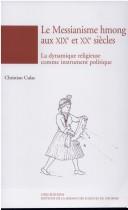| Listing 1 - 2 of 2 |
Sort by
|

ISBN: 2735109542 2271061024 Year: 2005 Publisher: Paris : CNRS Editions Editions de la Maison des Sciences de l'Homme,
Abstract | Keywords | Export | Availability | Bookmark
 Loading...
Loading...Choose an application
- Reference Manager
- EndNote
- RefWorks (Direct export to RefWorks)
Hmong (Asian people) --- Messianism --- Hmong (Peuple d'Asie) --- Messianisme --- Politics and government. --- Religion. --- Politique et gouvernement --- Religion --- Hmong (peuple d'Asie) --- Chamanisme --- Légendes hmong --- Moeurs et coutumes --- Asie du Sud-Est --- 19e siècle --- 20e siècle --- Légendes hmong --- 19e siècle --- 20e siècle
Book
ISBN: 2355960038 6169028270 Year: 2018 Publisher: Bangkok : Institut de recherche sur l’Asie du Sud-Est contemporaine,
Abstract | Keywords | Export | Availability | Bookmark
 Loading...
Loading...Choose an application
- Reference Manager
- EndNote
- RefWorks (Direct export to RefWorks)
Since the 1980s, while trying to maintain political stability and territorial integrity, the Vietnamese state has strongly moved towards the transformation of a centrally-planned economy to a more market-oriented model, in which private, foreign and joint-venture businesses are increasingly becoming the key pillars of the national economy. Another key aspect of the Đổi Mới's agenda was a fundamental shift in the party-state's foreign relations policy toward a normalization of Vietnam's diplomatic and trading relations with China, the United States, and other countries since the early 1990s. Over twenty years after the Đổi Mới renewal renovation, Vietnam has been praised by various domestic and international institutions for its “impressive” achievements in socio-economic development and poverty reduction and for its gradual liberalization and market diversification, coupled with its commitment to equality. Consequently, this has changed the relationship between the party-state and society in a number of fields, including the control of agricultural land and other forms of natural resources. Such transition marks a great change in our scholarly understanding of Vietnam. It has opened the door for intellectual exchange between academics and has resulted in a great amount of research and new knowledge/publications in different languages about various domains regarding Vietnamese society, including the relationships between the state and society at different levels and in various sectors or geographic areas. Among them, studies like those of Kerkvliet, Fforde and others, have developed the “everyday politics approach”, which examines social interactions on an everyday action basis. This approach “from below” has given a fresh impetus to the study of social relations in Vietnam. However, our observations regarding academic research show that besides a number of rich ethnographic studies, there are many analyses from different social science disciplines that give a…
Local government --- Vietnam --- Rural conditions --- Local administration --- Township government --- Subnational governments --- Administrative and political divisions --- Decentralization in government --- Public administration --- Betʻŭnam --- Biet Nam --- Bietnam --- Biyetnan --- Chính phủ nước Cộng hòa xã hội chủ nghĩa Việt Nam --- Cộng hòa xã hội chủ nghĩa Việt Nam --- Fītnām --- Fīyatnām --- Fiyitnām --- I︠U︡zhnyĭ Vʹetnam --- National Republic of Vietnam --- Nước Cộng hòa xã hội chủ nghĩa Việt Nam --- Petʻŭnam --- Republica Socialista de Vietnam --- Rèpublica socialista du Viêt Nam --- République socialiste du Vietnam --- RSV --- RSVN --- S.R.V. --- Satsyi︠a︡listychnai︠a︡ Rėspublika V'etnam --- Socialist Republic of Viet Nam --- Socialist Republic of Vietnam --- Sosialistiese Republiek Viëtnam --- Sot︠s︡ialisticheska republika Vietnam --- Sot︠s︡ialisticheskai︠a︡ Respublika Vʹetnam --- SRV --- SRVN --- Vʹet-Nam --- Vʹetnam --- Viet-Nam --- Vijetnam --- Vītnām --- Vīyitnām --- Vjetnamio --- Vyetnam --- Vyetnam Sosialist Respublikası --- Wietnam --- Yüeh-nan --- Сацыялістычная Рэспубліка В'етнам --- Социалистическа република Виетнам --- Виетнам --- В'етнам --- فيتنام --- Vietnam (Democratic Republic) --- Vietnam (Republic) --- economics --- development --- tourism --- growth --- land conflicts --- industrialization
| Listing 1 - 2 of 2 |
Sort by
|

 Search
Search Feedback
Feedback About UniCat
About UniCat  Help
Help News
News